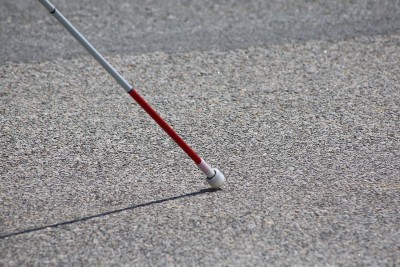Could I survive without sight? My experience with disability
by Beth
 When I’m not busy moderating this Easter Seals blog, I’m busy leading four different weekly memoir-writing classes for senior citizens — some classes sponsored by the City of Chicago’s Family and Support Services, other sponsored by different Chicago non-profit organizations. Writers in my classes grew up in Chicago’s south side, the suburbs, in farm towns, in Canada, India, the Philippines, you name it. We’ve been on break for a few weeks, and a writer who grew up in Germany took her time off to write about an unusual museum she visited during a recent trip home.
When I’m not busy moderating this Easter Seals blog, I’m busy leading four different weekly memoir-writing classes for senior citizens — some classes sponsored by the City of Chicago’s Family and Support Services, other sponsored by different Chicago non-profit organizations. Writers in my classes grew up in Chicago’s south side, the suburbs, in farm towns, in Canada, India, the Philippines, you name it. We’ve been on break for a few weeks, and a writer who grew up in Germany took her time off to write about an unusual museum she visited during a recent trip home.
Dialog in the Dark
by Brigitte Erbe
The Dialog Museum in Frankfurt, Germany, is a museum where sighted people experience the world of the blind for about an hour and a half. My friend and I were encouraged to check our sense of smell while we waited for the tour to start. There were about 10 unidentified “smelly pots,” and I failed miserably, recognizing just mint and garlic. If I had to rely on my sense of smell to cook, my meals would be inedible.
A blind guide introduced our group of 10 to the museum, where most of the staff is visually impaired or blind. She handed me a long walking cane. And then the doors closed behind us and we were in the dark. There was no light. None.
Living in a city, I never experience complete darkness. The voice of the guide was reassuring – “follow me,” he said, and this gave me a sense of direction. But there were 10 other people there on the tour, and I couldn’t see where they were. I learned to walk with one arm stretched out so I wouldn’t run into anyone.
And then suddenly I couldn’t hear or feel anyone, and I panicked. Had I been left behind? I called my friend’s name, and from then on we tried to stick together.
Our first stop was a small forest. I could feel the soft ground under my feet. I used my cane to feel for trees and managed to avoid collisions. We continued to a city street, felt a mailbox, and crossed a street with raised sidewalks. I listened for the traffic to stop, and for the beeping that accompanied the pedestrian light. The cane helped me identify the step down and up the curb. Following the voice of the guide, I groped my way along the wall to a boat, and swayed in the water as I stepped on. I held onto the railing for dear life, and again used my cane to probe for steps and obstacles.
I held on to the backs of strangers as we proceeded to a bar, where we could order drinks and pay for them in euros. I ordered a beer, pulled out a bill and got change back. I am a trusting soul. The guide offered to hold my cane while I poured my beer into a glass, but I refused to let go of my cane and drank my beer out of a bottle.
Sound and touch were the two ways I learned to orient myself. When I didn’t hear or feel anyone, I felt truly alone. I followed walls, straight and turning, with the touch of my hand and the touch of the cane. After constantly running into people, I learned to avoid them by stretching out my arm — I didn’t want to poke them with my cane. Still, there were plenty of apologies.
I followed the voice of the guide right up until the minute I turned in my cane and the door opened to my world of light. Before we left, our guide assured us that if we stayed inside the museum for just a few days we’d end up as familiar with these dark spaces as he is. Cane firmly grasped in my right hand, relying on my sense of touch and hearing, I believe I could learn to live in the dark — if only my sense of smell would improve.
Could you? What do you think?







October 20th, 2015 at 7:36 am
I would like to know what is available for legally Blind Veterans